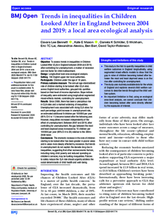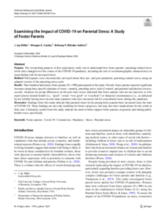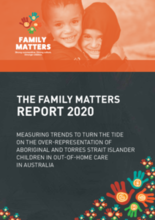Displaying 261 - 270 of 2221
Child Welfare: Preparing Social Workers for Practice in the Field is a comprehensive text for child welfare courses taught from a social work perspective. This textbook provides a single source for all material necessary for a contextual child welfare course.
The purpose of this study was to assess trends in inequalities in Children Looked After (CLA) in England between 2004 and 2019, after controlling for unemployment, a marker of recession and risk factor for child maltreatment.
This research focused on a U.S. statewide program that uses team decision-making meetings to identify needs and plan services for youth who are at risk for instability while in foster care.
The overarching purpose of this exploratory study was to understand how foster parents’ parenting-related stress levels have changed over the course of the COVID-19 pandemic, including the role of sociodemographic characteristics in exacerbating risk for increased stress.
This paper documents the alignment between the circumstances created by anti-Black racism at institutional, provincial, and federal levels and the seemingly race-neutral eligibility criteria embedded within Ontario child welfare, which results in disproportionate reporting of Black families.
The current study is the first to explore the prevalence of reproductive coercion among adolescent women currently or previously involved in the U.S. foster care system.
Family Matters reports focus on what governments are doing to turn the tide on over-representation of Aboriginal and Torres Strait Islander children in out-of-home care and the outcomes for children. They also highlight Aboriginal and Torres Strait Islander-led solutions and call on governments to support and invest in the strengths of Aboriginal and Torres Strait Islander peoples to lead on child wellbeing, development and safety responses for our children.
This study analyzed 10 years of federal child welfare data to understand the effect of foster care placement, provider, and support factors for children in foster care due to parental substance use disorder.
The purpose of this study is to test the validity of the Assessment Checklist measures in assessing complex mental health and behavioural difficulties of children and young people in care attending a specialist mental health service in Queensland, Australia.
This article studies how three groups of professional decision-makers – child welfare workers, experts on children and judges – exercise discretion in decisions on adoption from care in the Norwegian child welfare system.



